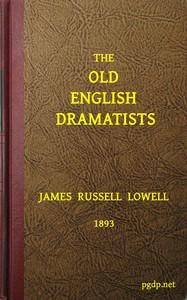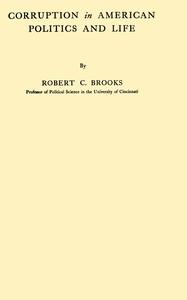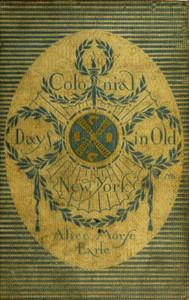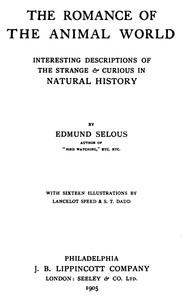|
|
Read this ebook for free! No credit card needed, absolutely nothing to pay.Words: 31335 in 7 pages
This is an ebook sharing website. You can read the uploaded ebooks for free here. No credit cards needed, nothing to pay. If you want to own a digital copy of the ebook, or want to read offline with your favorite ebook-reader, then you can choose to buy and download the ebook.

: The old English dramatists by Lowell James Russell Norton Charles Eliot Author Of Introduction Etc - English drama Early modern and Elizabethan 1500-1600 History and criticism@FreeBooksMon 08 Apr, 2024 THE OLD ENGLISH DRAMATISTS INTRODUCTORY When the rule limiting speeches to an hour was adopted by Congress, which was before most of you were born, an eminent but somewhat discursive person spent more than that measure of time in convincing me that whoever really had anything to say could say it in less. I then and there acquired a conviction of this truth, which has only strengthened with years. Yet whoever undertakes to lecture must adapt his discourse to the law which requires such exercises to be precisely sixty minutes long, just as a certain standard of inches must be reached by one who would enter the army. If one has been studying all his life how to be terse, how to suggest rather than to expound, how to contract rather than to dilate, something like a strain is put upon the conscience by this necessity of giving the full measure of words, without reference to other considerations which a judicious ear may esteem of more importance. Instead of saying things compactly and pithily, so that they may be easily carried away, one is tempted into a certain generosity and circumambience of phrase, which, if not adapted to conquer Time, may at least compel him to turn his glass and admit a drawn game. It is so much harder to fill an hour than to empty one! These thoughts rose before me with painful vividness as I fancied myself standing here again, after an interval of thirty-two years, to address an audience at the Lowell Institute. Then I lectured, not without some favorable acceptance, on Poetry in general and what constituted it, on Imagination and Fancy, on Wit and Humor, on Metrical Romances, on Ballads, and I know not what else--on whatever I thought I had anything to say about, I suppose. Then I was at the period in life when thoughts rose in coveys, and one filled one's bag without considering too nicely whether the game had been hatched within his neighbor's fence or within his own,--a period of life when it doesn't seem as if everything had been said; when a man overestimates the value of what specially interests himself, and insists with Don Quixote that all the world shall stop till the superior charms of his Dulcinea of the moment have been acknowledged; when he conceives himself a missionary, and is persuaded that he is saving his fellows from the perdition of their souls if he convert them from belief in some aesthetic heresy. That is the mood of mind in which one may read lectures with some assurance of success. I remember how I read mine over to the clock, that I might be sure I had enough, and how patiently the clock listened, and gave no opinion except as to duration, on which point it assured me that I always ran over. This is the pleasant peril of enthusiasm, which has always something of the careless superfluity of youth. Since then, and for a period making a sixth part of my mature life, my mind has been shunted off upon the track of other duties and other interests. If I have learned something, I have also forgotten a good deal. One is apt to forget so much in the service of one's country,--even that he is an American, I have been told, though I can hardly believe it. When I selected my topic for this new venture, I was returning to a first love. The second volume I ever printed, in 1843, I think it was,--it is now a rare book, I am not sorry to know; I have not seen it for many years,--was mainly about the Old English Dramatists, if I am not mistaken. I dare say it was crude enough, but it was spontaneous and honest. I have continued to read them ever since, with no less pleasure, if with more discrimination. But when I was confronted with the question what I could say of them that would interest any rational person, after all that had been said by Lamb, the most sympathetic of critics, by Hazlitt, one of the most penetrative, by Coleridge, the most intuitive, and by so many others, I was inclined to believe that instead of an easy subject I had chosen a subject very far from easy. But I sustained myself with the words of the great poet who so often has saved me from myself:-- "Vagliami il lungo studio e il grande amore, Che m'ha fatto cercar lo tuo volume." If I bring no other qualification, I bring at least that of hearty affection, which is the first condition of insight. I shall not scruple to repeat what may seem already too familiar, confident that these old poets will stand as much talking about as most people. At the risk of being tedious, I shall put you back to your scales as a teacher of music does his pupils. For it is the business of a lecturer to treat his audience as M. Jourdain wished to be treated in respect of the Latin language,--to take it for granted that they know, but to talk to them as if they did n't. I should have preferred to entitle my course Readings from the Old English Dramatists with illustrative comments, rather than a critical discussion of them, for there is more conviction in what is beautiful in itself than in any amount of explanation why, or exposition of how, it is beautiful. A rose has a very succinct way of explaining itself. When I find nothing profitable to say, I shall take sanctuary in my authors. To return. The Interlude may have kept alive the traditions of a stage, and may have made ready a certain number of persons to assume higher and graver parts when the opportunity should come; but the revival of learning, and the rise of cities capable of supplying a more cultivated and exacting audience, must have had a stronger and more direct influence on the growth of the Drama, as we understand the word, than any or all other influences combined. Certainly this seems to me true of the English Drama at least. The English Miracle Plays are dull beyond what is permitted even by the most hardened charity, and there is nothing dramatic in them except that they are in the form of dialogue. The Interludes are perhaps further saddened in the reading by reminding us how much easier it was to be amused three hundred years ago than now, but their wit is the wit of the Eocene period, unhappily as long as it is broad, and their humor is horse-play. We inherited a vast accumulation of barbarism from our Teutonic ancestors. It was only on those terms, perhaps, that we could have their vigor too. The Interludes have some small value as illustrating manners and forms of speech, but the man must be born expressly for the purpose--as for some of the adventures of mediaeval knight-errantry--who can read them. "Gammer Gurton's Needle" is perhaps as good as any. It was acted at Christ's College, Cambridge, in 1566, and is remarkable, as Mr. Collier pointed out, as the first existing play acted before either University. Its author was John Still, afterwards Bishop of Bath and Wells, and it is curious that when Vice-Chancellor of Cambridge he should have protested against the acting before the University of an English play so unbefitting its learning, dignity, and character. "Gammer Gurton's Needle" contains a very jolly and spirited song in praise of ale. Latin plays were acted before the Universities on great occasions, but there was nothing dramatic about them but their form. One of them by Burton, author of the "Anatomy of Melancholy," has been printed, and is not without merit. In the "Pardoner and the Frere" there is a hint at the drollery of those cross-readings with which Bonnell Thornton made our grandfathers laugh:-- Everything in these old farces is rudimentary. They are not merely coarse; they are vulgar. In Spain it was otherwise. There the old Moralities and Mysteries of the Church Festivals are renewed and perpetuated in the Autos Sacramentales of Calderon, but ensouled with the creative breath of his genius, and having a strange phantasmal reality in the ideal world of his wonder-working imagination. One of his plays, "La Devocion de la Cruz," an Auto in spirit if not in form, dramatizes, as only he could do it, the doctrine of justification by faith. In Spain, too, the comedy of the booth and the plaza is plainly the rude sketch of the higher creations of Tirso and Lope and Calderon and Rojas and Alarcon, and scores of others only less than they. The tragicomedy of "Celestina," written at the close of the fifteenth century, is the first modern piece of realism or naturalism, as it is called, with which I am acquainted. It is coarse, and most of the characters are low, but there are touches of nature in it, and the character of Celestina is brought out with singular vivacity. The word tragicomedy is many years older than this play, if play that may be called which is but a succession of dialogues, but I can think of no earlier example of its application to a production in dramatic form than by the Bachelor Fernando de Rojas in this instance. It was made over into English, rather than translated, in 1520,--our first literary debt to Spain, I should guess. The Spanish theatre, though the influence of Seneca is apparent in the form it put on, is more sincerely a growth of the soil than any other of modern times, and it has one interesting analogy with our own in the introduction of the clown into tragedy, whether by way of foil or parody. The Spanish dramatists have been called marvels of fecundity, but the facility of their trochaic measure, in which the verses seem to go of themselves, makes their feats less wonderful. The marvel would seem to be rather that, writing so easily, they also wrote so well. Their invention is as remarkable as their abundance. Their drama and our own have affected the spirit and sometimes the substance of later literature more than any other. They have to a certain extent impregnated it. I have called the Spanish theatre a product of the soil, yet it must not be overlooked that Sophocles, Euripides, Plautus, and Terence had been translated into Spanish early in the sixteenth century, and that Lope de Rueda, its real founder, would willingly have followed classical models more closely had the public taste justified him in doing so. But fortunately the national genius triumphed over traditional criterions of art, and the Spanish theatre, asserting its own happier instincts, became and continued Spanish, with an unspeakable charm and flavor of its own. I have said nothing of the earlier Italian Drama because it has failed to interest me. But Italy had indirectly a potent influence, through Spenser, in supplying English verse till it could answer the higher uses of the stage. The lines--for they can hardly be called verses--of the first attempts at regular plays are as uniform, flat, and void of variety as laths cut by machinery, and show only the arithmetical ability of their fashioners to count as high as ten. A speech is a series of such laths laid parallel to each other with scrupulous exactness. But I shall have occasion to return to this topic in speaking of Marlowe. Who, then, were the Old English Dramatists? They were a score or so of literary bohemians, for the most part, living from hand to mouth in London during the last twenty years of the sixteenth century and the first thirty years of the seventeenth, of the personal history of most of whom we fortunately know little, and who, by their good luck in being born into an unsophisticated age, have written a few things so well that they seem to have written themselves. Poor, nearly all of them, they have left us a fine estate in the realm of Faery. Among them were three or four men of genius. A comrade of theirs by his calling, but set apart from them alike by the splendor of his endowments and the more equable balance of his temperament, was that divine apparition known to mortals as Shakespeare. The civil war put an end to their activity. The last of them, in the direct line, was James Shirley, remembered chiefly for two lines from the last stanza of a song of his in "The Contention of Ajax and Ulysses," which have become a proverb:-- Free books android app tbrJar TBR JAR Read Free books online gutenberg More posts by @FreeBooks
: Corruption in American politics and life by Brooks Robert C Robert Clarkson - United States Social conditions 1865-1918; Political corruption United States@FreeBooksMon 08 Apr, 2024

: Colonial days in old New York by Earle Alice Morse - New York (State) History Colonial period ca. 1600-1775; New York (State) Social life and customs To 1775@FreeBooksMon 08 Apr, 2024
|
Terms of Use Stock Market News! © gutenberg.org.in2025 All Rights reserved.






